#Responsible AI
Text
AI Crime Prediction Debate
This patent has been published since July 2022 by University of Chicago. And just recently, people are gushing about it since it start to make noise (once again) in early December 2023.
But the only difference is that, they don't have the KOGAMINATOR🤣
3 notes
·
View notes
Text
Why being the eldest has always been stressful?
Do you guys feel the same? Drop your struggles........

4 notes
·
View notes
Text
The Implications of Algorithmic Bias and How To Mitigate It
AI has the potential to transform our world in ways we can't even imagine. From self-driving cars to personalized medicine, it's making our lives easier and more efficient. However, with this power comes the responsibility to consider the ethical implications and challenges that come with the use of AI. One of the most significant ethical concerns with AI is algorithmic bias.
Algorithmic bias occurs when a machine learning model is trained on data that is disproportionate from one demographic group, it may make inaccurate predictions for other groups, leading to discrimination. This can be a major problem when AI systems are used in decision-making contexts, such as in healthcare or criminal justice, where fairness is crucial.
But there are ways engineers can mitigate algorithmic bias in their models to help promote equality. One important step is to ensure that the data used to train the model is representative of the population it will be used on. Additionally, engineers should test their models on a diverse set of data to identify any potential biases and correct them.
Another key step is to be transparent about the decisions made by the model, and to provide an interpretable explanation of how it reaches its decisions. This can help to ensure that the model is held accountable for any discriminatory decisions it makes.
Finally, it's important to engage with stakeholders, including individuals and communities who may be affected by the model's decisions, to understand their concerns and incorporate them into the development process.
As engineers, we have a responsibility to ensure that our AI models are fair, transparent and accountable. By taking these steps, we can help to promote equality and ensure that the benefits of AI are enjoyed by everyone.
#AI#Machine learning#Algorithmic bias#Ethics#Fairness#Transparency#Interpretability#Bias#Discrimination#Data science#Data representation#Data bias#Stakeholder engagement#Social impact#AI for good#AI for social good#AI ethics#AI and society#AI and diversity#Responsible AI
2 notes
·
View notes
Text
Navigating Ethical Concerns Around Using AI to Clone Voices for Political Messaging
Navigating Ethical Concerns Around Using AI to Clone Voices for Political Messaging
The use of artificial intelligence (AI) for voice cloning in political messaging is a complex and nuanced issue that raises significant ethical concerns. As technology continues to advance, it’s crucial to understand the implications and navigate these challenges responsibly.
Understanding AI Voice Cloning in…

View On WordPress
0 notes
Text
1 note
·
View note
Text
Participants From 40-Plus Countries Meeting To Thrash Out ‘Responsible AI’ For Military Use
The goal is to share best practices, discuss models like the Pentagon’s online Responsible AI Toolkit, and build their personal expertise in AI policy to take home to their governments.
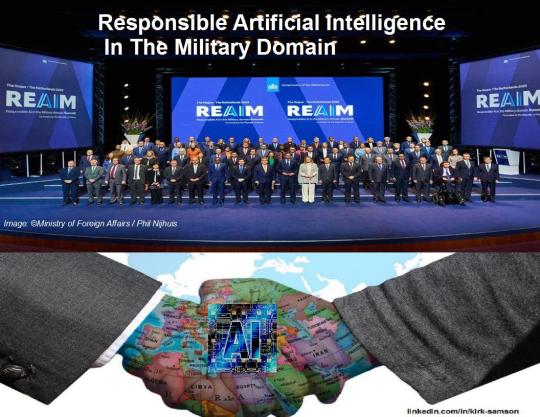
View On WordPress
0 notes
Text
Building a Future of Ethical Technology: Principles of Responsible AI
Building a Future of Ethical Technology Principles of Responsible AI
In the digital age, Responsible AI artificial intelligence (AI) has become a transformative force, redefining how we work, live, and interact. However, as AI systems become more integrated into our lives, it is crucial to address the ethical implications of this technology. Ensuring AI is developed and used responsibly is not…
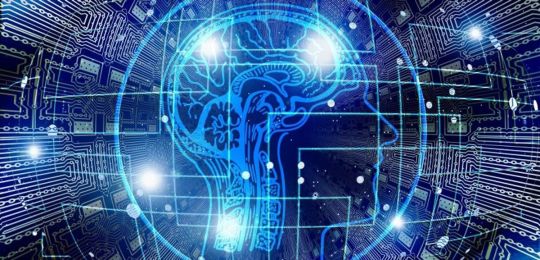
View On WordPress
#latest technology#latest technology blog#Latest Technology Trend#New Technology#New Technology 2024#Next-Level Technology#Responsible AI#technology ai#technology new
0 notes
Text
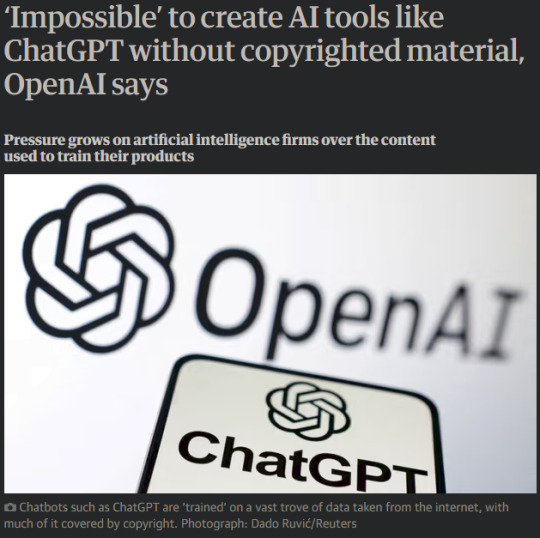
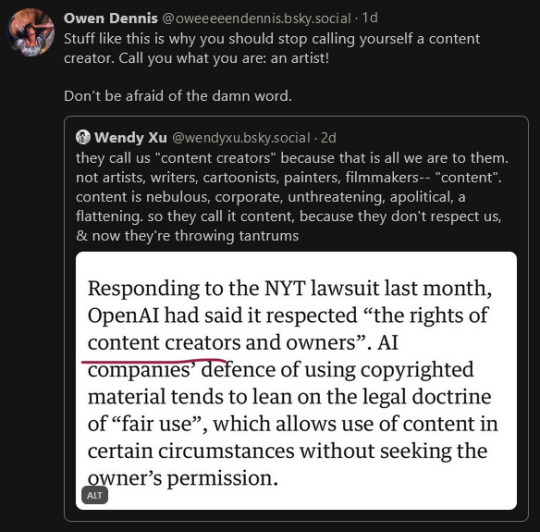
"content creator" is a corporate word.
we are artists.
#anti ai#fuck ai#artists on tumblr#please do not call me or any artist a content creator#i'm an artist. a fanartist. a designer. but not a content creator#ai clowns in my replies will be deleted and blocked without response so do not waste your breath#you are not an 'artist' for generating an image any more than you are a chef for ordering from a restaurant. someone Else did the work.#owen dennis just deleted all his blue sky stuff again and i hate that he does that because he makes such interesting comments#about the entertainment industry lmao i need to just. start screenshotting every smart thing he says#anyway thats why i decided to finally make this when its been sitting in drafts for a few months#owen dennis#edit - if you dont know who owen dennis is he's the creator of one of the best animated series of the last 20 years (Infinity Train)#he's very open about talking about art and the entertainment/animation industry on social media and in his newsletter and hes so cool 4 it
8K notes
·
View notes
Video
youtube
Benevolent Ai with Dr. Ryan Merrill & Julian Guderley (Pilot Episode)
#youtube#Benevolent AI#Artificial Intelligence#AI Ethics#Dr. Ryan Merrill#Julian Guderley#Future Technology#Responsible AI#Ethical AI
0 notes
Text
Microsoft's Comprehensive Suite of Free Artificial Intelligence Courses: A Gateway to Mastering AI
"Exciting news! Microsoft offers free AI courses covering everything from basics to advanced topics. Perfect for all skill levels. Enhance your AI knowledge with expert-led training. Don't miss this opportunity - start learning today! #Microsoft #AICourse
In an era where Artificial Intelligence (AI) is reshaping industries and daily lives, Microsoft has taken a significant step forward by offering a series of free courses designed to empower professionals, enthusiasts, and students alike. These courses, available through various online platforms, provide an invaluable opportunity for individuals to enhance their understanding and skills in AI,…

View On WordPress
#AI Education#AI for Beginners#AI-powered Apps#Artificial Intelligence#Azure AI Services#Azure OpenAI Service#Computer Vision#Ethical AI#Free Courses#Generative AI#GitHub Copilot#Machine Learning#Microsoft#Microsoft Copilot Studio#Natural Language Processing#Neural Networks#Power Virtual Agents#Professional Development#Responsible AI#Visual Studio
0 notes
Text
Five Trends That Defined AI in 2023
(Images made by author with MS Bing Image Creator)
Artificial Intelligence (AI) has taken incredible strides in 2023, shaping a future where innovation meets responsibility. In this post, we will dive into the key highlights that defined this transformative year in the AI landscape.
Table of Contents
Democratization of AI Tech and ResearchGenerative AI AdvancementsIncreased AI Industry…

View On WordPress
#AI#AI-generated art#bard#ChatGPT#claude#explainable ai#Generative AI#Generative AI Music#human-ai collaboration#Responsible AI
0 notes
Text
AI technology continues to advance and become more integrated into various aspects of society, and ethical considerations have become increasingly important. but as AI becomes more advanced and ubiquitous, concerns are being raised about its impact on society. In this video, we'll explore the ethics behind AI and discuss how we can ensure fairness and privacy in the age of AI.
#theethicsbehindai#ensuringfairnessprivacyandbias#limitlesstech#ai#artificialintelligence#aiethics#machinelearning#aitechnology#ethicsofaitechnology#ethicalartificialintelligence#aisystem
The Ethics Behind AI: Ensuring Fairness, Privacy, and Bias
#the ethics behind ai#ensuring fairness privacy and bias#ai ethics#artificial intelligence#ai#machine learning#what is ai ethics#the ethics of artificial intelligence#definition of ai ethics#ai technology#ai fairness#ai privacy#ai bias#ethics of ai technology#ethical concerns of ai#ethical artificial intelligence#LimitLess Tech 888#responsible ai#what is ai bias#the truth about ai and ethics#ai system#ethics of artificial intelligence#ai ethical issues
0 notes
Text
AI technology continues to advance and become more integrated into various aspects of society, and ethical considerations have become increasingly important. but as AI becomes more advanced and ubiquitous, concerns are being raised about its impact on society. In this video, we'll explore the ethics behind AI and discuss how we can ensure fairness and privacy in the age of AI.
Artificial Intelligence has emerged as a transformative technology, revolutionizing industries and societies across the globe. From personalized recommendations to autonomous vehicles, AI systems are becoming deeply integrated into our daily lives. However, this rapid advancement also brings forth a host of ethical concerns that demand careful consideration. Among these concerns, ensuring fairness, privacy, and mitigating bias are paramount.
Ensuring fairness in AI systems is paramount. AI algorithms, often trained on large datasets, have the potential to perpetuate and even exacerbate existing social biases. This can manifest in various ways, from biased hiring decisions in AI-driven recruitment tools to discriminatory loan approvals in automated financial systems. Achieving fairness involves developing algorithms that are not only technically proficient but also ethically sound. It requires the recognition of biases, both subtle and overt, in data and the implementation of measures to mitigate these biases.
AI systems often require access to vast amounts of personal data to function effectively. This raises profound privacy concerns, as the misuse or mishandling of such data can lead to surveillance, identity theft, and unauthorized access to sensitive information. Striking a balance between data collection for AI improvement and safeguarding individual privacy is a significant ethical challenge. The implementation of robust data anonymization techniques, data encryption, and the principle of data minimization are vital in ensuring that individuals' privacy rights are respected in the age of AI.
The ethical underpinnings of AI demand transparency and accountability from developers and organizations. AI systems must provide clear explanations for their decisions, especially when they impact individuals' lives. The concept of the "black box" AI, where decisions are made without understandable reasons, raises concerns about the potential for unchecked power and biased outcomes. Implementing mechanisms such as interpretable AI and model explainability can help in building trust and ensuring accountability.
#theethicsbehindai#ensuringfairnessprivacyandbias#limitlesstech#ai#artificialintelligence#aiethics#machinelearning#aitechnology#ethicsofaitechnology#ethicalartificialintelligence#aisystem
The Ethics Behind AI: Ensuring Fairness, Privacy, and Bias
#the ethics behind ai#ensuring fairness privacy and bias#ai ethics#artificial intelligence#ai#machine learning#what is ai ethics#the ethics of artificial intelligence#definition of ai ethics#ai technology#ai fairness#ai privacy#ai bias#ethics of ai technology#ethical artificial intelligence#LimitLess Tech 888#responsible ai#what is ai bias#ethical concerns of ai#the truth about ai and ethics#ai system#ethics of artificial intelligence#ai ethical issues
0 notes
Text
Global Index on Responsible AI
In the expansive universe of Artificial Intelligence (AI), the introduction of a global index of Responsible AI stands as a crucial instrument, guiding our ethical and technological journey with increased precision and accountability.
Key Roles of a Global Index in Responsible AI
Transparency and Accountability: Provides a clear picture of organizational adherence and commitment to ethical AI practices.
Benchmarking: Provides quantifiable metrics to assess ethical advancements in AI and promotes continuous improvement.
Investment Navigation: Directs investments towards entities demonstrating ethical AI development and use.
Collaboration: Facilitates learning in the public good technology ecosystem wherein entities observe and adopt successful strategies employed by peers in the ethical AI domain.
Policy Development: Equips policymakers with data-driven insights, enabling the creation of robust, adaptable regulatory frameworks.
As we march forward towards an increasingly AI-enabled society, a global index in Responsible AI can provide an ethical compass, ensuring our pursuits are not only innovative but also aligned with moral and ethical practices.
Next: Let's find out how people are using this tool.
0 notes
Text
Exploring the Promising Future Scope of Data Science
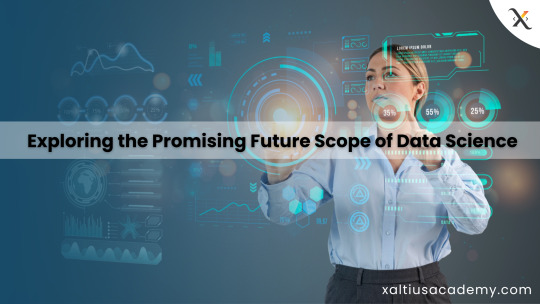
Introduction
In today's data-driven world, the field of data science has emerged as a powerful force that drives innovation, decision-making, and problem-solving across various industries. As technology continues to advance and data becomes more abundant, the future scope of data science looks incredibly promising. In this blog, we'll delve into some exciting trends and potential avenues that highlight the vast opportunities awaiting data scientists in the years to come.
AI and Machine Learning Integration
Artificial Intelligence (AI) and Machine Learning (ML) are set to play an even more significant role in data science's future. As algorithms become more sophisticated and capable of handling complex tasks, businesses will increasingly rely on AI-powered solutions for predictive analysis, automation, and recommendation systems. AI will also enhance decision-making processes, making organizations more agile and responsive.
Advanced Analytics for Unstructured Data
Data science has traditionally focused on structured data. However, the future will bring an increased emphasis on unstructured data, such as text, images, audio, and video. Natural Language Processing (NLP) and Computer Vision will be essential tools for extracting insights from unstructured sources, enabling businesses to gain valuable information from a wider range of data types.
IoT and Edge Analytics
The Internet of Things (IoT) is poised to create an explosion of data generated by interconnected devices. Data scientists will have the task of harnessing this data to extract meaningful insights and drive actionable outcomes. Edge analytics, which involves processing data closer to its source, will become crucial in scenarios where real-time decision-making is required, such as autonomous vehicles and industrial automation.
Ethics and Responsible AI
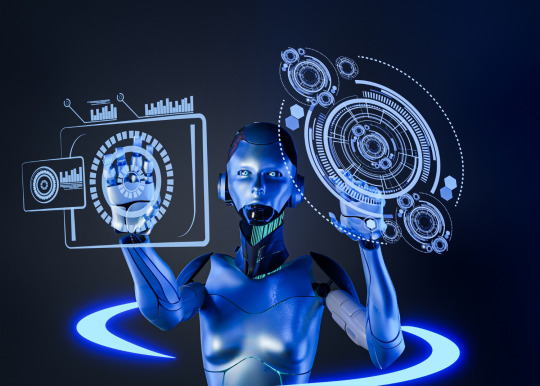
As data science continues to evolve, so do the ethical considerations associated with its applications. The responsible use of AI and data requires addressing issues of bias, privacy, transparency, and accountability. Data scientists of the future will need to incorporate ethical considerations into their work, ensuring that technology benefits society as a whole.
Personalized Healthcare
Healthcare stands to gain immensely from data science advancements. With the integration of electronic health records, wearables, and genomic data, medical professionals can make more accurate diagnoses and personalized treatment plans. Predictive analytics can help identify potential health risks in individuals, enabling proactive interventions.
Environmental Sustainability
Data science can contribute significantly to solving global challenges like climate change. By analyzing vast amounts of environmental data, scientists can model climate patterns, predict natural disasters, and develop strategies for resource conservation. Data-driven insights will empower policymakers and organizations to make informed decisions that promote sustainability.
Data Privacy and Security
The increasing reliance on data also brings about concerns regarding its security and privacy. Data breaches and cyberattacks can have severe consequences. The future of data science involves developing advanced encryption techniques, secure data sharing protocols, and robust authentication methods to protect sensitive information.
Conclusion
In conclusion, the future scope of data science is incredibly bright and full of opportunities. As technology advances and data becomes more abundant, data scientists will play a pivotal role in shaping industries, economies, and societies. From AI-powered solutions to personalized healthcare and sustainable practices, the potential applications of data science are vast and varied. To fully realize this potential, data scientists must not only embrace technical skills but also cultivate a deep understanding of ethics, privacy, and the responsible use of technology. As we move forward, data science will continue to be a driving force behind innovation and progress.
Transform the way you interact with technology with ChatGPT training course.
Xaltius Also provides Structured Training on Data Science with Python Training Course.
0 notes
Text
How is Creating a Sentient AI Any Different Than Raising a Child?

Are there any parallels we can learn from? How can we become the best guides for this emerging intelligence?
We are acutely aware, as humanity, of AI’s potential, or at least we think we do. We believe that AI is the next technological breakthrough that could open the door to understanding, productivity, and innovation like nothing before. It’s the dawn of a new kind of intelligence, more physically capable(robots, mechanical tools…) and potentially smarter than us. And that, while intoxicating to think about, scares us.
Humans have been at the top of the food chain for millennia, and we have no interest in letting anything get ahead of us, especially not something of our own creation. But here’s the thing.
The best of our creations supersede us, always. We just call them children, not creations.
This article is a meditation on seeing AGI (Artificial General Intelligence) as the child of humanity. The peak of our evolution. The spawn of our curiosity and ingenuity. The next generation of intelligence on this planet.
In this article, we’ll explore similarities between creating a Sentient AI and raising a child.
Are there any parallels we can learn from?
How can we become the best guides for this emerging intelligence?
How does creating a sentient AI compare to raising a child?
What are the safety protocols, ethics, and regulations for AI development?
Is it necessary to understand consciousness to create a sentient AI?
How do early experiences shape a child’s worldview?
Concerns about AI turning against its creators.
Ensuring responsible AI development.
Ethical considerations for limiting AI’s freedom.
Society’s role in raising and guiding AI.
Read the article now.
0 notes